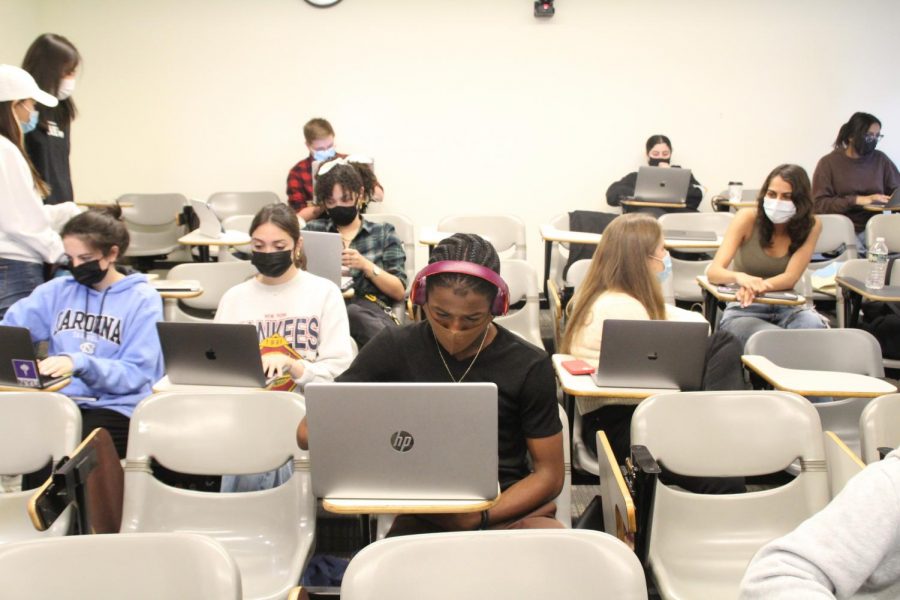Editorial: NYU must expand virtual attendance options
Although we’re making progress in the fight against COVID-19, it is essential that virtual attendance options are available to the NYU student body.
Students in a classroom attend in-person classes with limited safety precautions. NYU needs to provide virtual class options for students who cannot attend campus due to COVID restrictions. (Photo by Manaal Shareh)
October 4, 2021
Students received some revolutionary advice from a wise and ever-helpful NYU Returns email on Sept. 30: stay home if they feel sick and report any symptoms to the NYU COVID-19 Prevention and Response Team. This statement is factually correct and should be followed, but NYU’s lack of remote learning options incentivizes students to disregard this advice.
At present, NYU courses are not required to offer virtual options. WSN’s reporting has illustrated the difficulties that students with disabilities face when requesting remote accommodations. NYU Tandon’s website states that “accomodations for remote access will be limited.” This could force people with symptoms of COVID-19 to attend in-person classes, fearful of lowered grades and other negative outcomes of missing class. If someone cannot or should not physically attend classes, they should have the option to attend virtually. NYU must create a universal virtual learning option to serve the student body and protect public health.
Unfortunately, NYU’s return to in-person classes has not factored in the possibility of contagious students attending classes. WSN reporting demonstrates that in-person classes, especially within the Cantor Film Center, leave no possibility for social distancing and put students in high-density environments. The university administration has cited NYU’s high vaccination rates as a reason to return to normalcy, but all it takes is one breakthrough case for this policy to have potentially fatal consequences. As vaccines lose efficacy over time, it is essential that we take the necessary precautions to stop the spread of COVID-19 and prevent needless risk to our student body.
New COVID-19 variants that are more resistant to vaccines are emerging, including the Lambda and Mu variants. The Mu variant, in particular, has been detected in all 50 U.S. states and has higher transmissibility and greater resistance to antibodies. Although vaccinations still prevent serious illness and complications, with rising cases of vaccine-resistant variants, additional safety measures and accommodations are increasingly necessary, especially for vulnerable NYU community members.
There are more than 3,500 NYU students with a disability as of 2019. Every single one is failed by NYU’s existing lack of remote learning options. The lives of immunocompromised students are put at risk because of the incentive for sick kids to come into class.
People with existing health problems are more vulnerable to COVID-19 and at higher risk for severe complications. The negative effects of COVID-19 can also persist long after an individual is free of the virus. Over a third of COVID-19 patients have “long-COVID,” where symptoms last for 3-6 months after the initial diagnosis. NYU’s existing policies place students at risk of disability or even death. Moreover, there’s little information on how long long-COVID symptoms last. Therefore, while we learn more about COVID-19’s long-term impacts on the body, virtual learning should remain an option for anyone who is concerned about contracting the virus.
It’s not as if virtual learning would be an enormous burden on NYU. Over the course of two weeks in March of 2020, NYU’s courses moved entirely to Zoom and remained there for two more semesters — for over a year, every course was offered virtually. All a professor needs in order to offer a virtual option is a computer with Zoom installed. A virtual option imposes no financial burden on campus administration and it should be offered for all students as soon as possible.
A version of this story appeared in the Oct. 4, 2021, e-print edition. Contact the Editorial Board at [email protected].
























































































































































